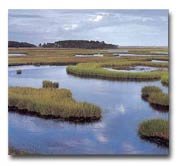About Coastal Areas
EPA's study of ecosystem management of coastal areas adaption relevance to climate change includes the results of the study of the following projects:
- Coral Reef Adaptation: EPA utilized the Adaptation Design Tool for the coral reef adaptation project to provide valued ecosystem services such as fisheries, coastal protection, and tourism with a plan when these are threatened by the effects of increased sea surface temperatures, sea level rise, and intensifying storms.

- Delaware Bay Wetland: Coastal salt marshes - which provide valued ecosystem services such as flood control, water purification and critical habitat - are vulnerable to ongoing sea level rise, which is interacting with physical and biological attributes of the system to induce complex changes in salt marsh habitats.
Adaptation professionals and others interested in understanding sea-level-rise vulnerability in coastal areas can use EPA's SEA Tool to understand potential impacts of sea-level rise and provide valuable data for coastal planning, infrastructure development, and risk management. The user-friendly nature of the tool provides clear and specific data for varied sea-level-rise scenarios to help ensure that users can easily access the data, investigate scenarios most relevant for them, and accurately and effectively incorporate outputs into decision making.
About SEA Tool

